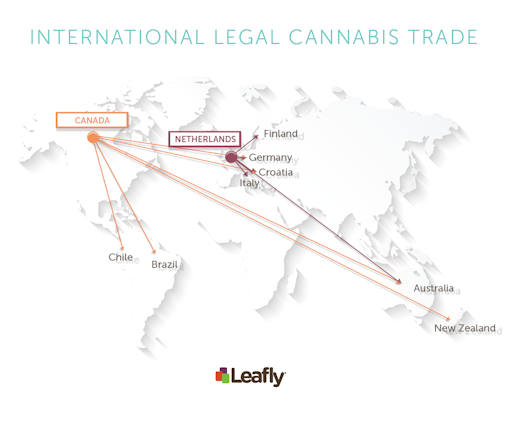While the U.S. continues to squabble state-by-state over medical and adult use legalization, over the past year cannabis has quietly grown into a truly international industry.
International trade began with the Netherlands and Canada, but is expected to expand rapidly.
A number of companies are now moving medical cannabis around the globe for medical purposes and studies, with major markets and producers in the Americas and Europe. That legal international trade began with two source countries—the Netherlands and Canada—but it’s expected to grow at an ever-increasing rate in coming years.
“It’s really about time,” said Eric Klein of Canada’s Cronos Group. “It takes time to build. The industry is moving so quickly.”
Cronos Group owns Peace Naturals, one Canada’s 38 licensed medical facilities and the nation’s first licensed medical cannabis producer. Peace Naturals began making exports of cannabis flower to German pharmacies on Oct. 5, 2016. German health officials approved a medical marijuana program for severe illnesses on May 4, 2016, and passed the necessary legislation in January 2017. Until the country establishes its own cannabis growing facilities, it will import the product.
Klein said his company sees more of a future with medical cannabis.
“Our projections indicate that the global international medical cannabis market will develop faster than the recreational market,” Klein wrote, “and that the size of the opportunity will be dictated by market specific regulations.”
Exporters and importers
Over the past year, federally licensed medical cannabis producers like Peace Naturals, Tilray, and Tweed in Canada have exported to Germany, Croatia, New Zealand, Brazil, and Chile. In the Netherlands, the longtime cannabis company Bedrocan has shipped product to Canada, Australia, and European Union nations. Meanwhile, the Dutch government’s Office of Medicinal Cannabis sends shipments of medical marijuana to Italy, Germany, and Finland.
More countries are opening up to the legal and heavily regulated trade. Tilray has plans to export cannabis to Brazil and has orders with several other undisclosed European Union nations. Earlier this week the company announced it had reached an agreement with the Australian state of Victoria to deliver medicinal cannabis to 29 children with epilepsy. (Editor’s note: Tilray is owned by Privateer Holdings, the private equity firm that also owns Leafly.)
Here’s what that trade looks like so far:

Two exporting nations dominate the trade in early 2017. By next year Israel may join them. The United States? Who knows. (Click on image to enlarge. Graphic by Amy Phung/Leafly.)
Israel — one of the United States’ leading pharmaceutical suppliers — is also one of the world’s leaders in medical cannabis research. After conservative religious leaders said Judaism does not forbid cannabis consumption, the nation has taken strides towards decriminalizing marijuana possession in recent months, expanding medical access, and allowing medical cannabis exports with an eye toward the U.S. market. One of Israel’s leading cannabis companies, Tikun Olam, has established a U.S. subsidiary, Tikun Olam USA, with an office in New York City. But Israel has yet to actually begin shipping product outside its borders.
Conspicuously missing from this global market, of course, is the United States.
Conspicuously missing from this global market, of course, is the United States. Federal and state laws still forbid any state from accepting medical cannabis imports. Federal law still lists cannabis as a Schedule I controlled substance with no medical use—so it’s all but impossible to move it legally through customs. And state legalization laws have all—so far—established ironclad rules against cannabis moving cross state lines.
“In the US market, it’s a state by state regulation process,” Klein explained. “There are limits on what you can do.”
Even with rigid export rules, more than pure product makes its way across borders. Companies can export technical knowledge, brand-building opportunities, and horticultural expertise where federal enforcement would stop a shipment of kush.
Shop highly rated dispensaries near you
Showing you dispensaries nearLicensing agreements and science swapping are one of the ways U.S. cannabis companies can interact across state lines without breaking residency requirements or transport laws. International relationships are similar.
Tikun Olam USA previously planned to partner with Canada’s MedReleaf Corp. and the Compassionate Care Center of New York (CCCNY). Though CCCNY did not end up getting licensed, the plan would have given it the genetic rights to several of Tikun Olam’s strains, and Israeli and Canadian partner experts would have helped the company grow them to spec on US soil at a Newark greenhouse. Tikun Olam continues to seek similar plans with international partners.
Here’s how it works
The legal international cannabis trade is currently limited to medical distribution, clinical research, and compassionate access. Adult-use cannabis does not, as of yet, legally cross national borders. Typically, the importing nation issues a permit that adheres to the regulatory structure of its medical laws. The exporting company gets approval from its own respective national health department and export authority. Each nation must report how much it produces and consumes domestically, as well as exports or imports internationally, to the International Narcotics Control Board, which is the United Nations’s independent control body for international drug conventions.
Companies entering the import-export market see their efforts as long-term investments, not one-off projects. In interviews with Leafly, officials with Tilray and Peace Naturals both emphasized a desire to develop continued relationships with their market destinations.
As the first G7 nation with a national medical cannabis system, Canada has quickly become the worldwide leader in medical exports.
“Cronos has already announced a partnership with (German cannabis import and distribution company) Pedanios, which will enable us to extend into the EU and Switzerland,” Klein wrote. “We are focused on developing an international distribution network, and continue to canvas the horticultural and regulatory landscape while aggressively pursuing strategic interests in multiple markets.”
Exported products vary according to demand and purpose. Peace Naturals exports whole flower, while Tilray exports flower, oil, and cannabinoid-based liquid capsules. The type of product depends on the destination’s need, not any legal strictures — whether clinical trial or direct consumer distribution, medical weed is medical weed, from a legal standpoint.
“It all depends on the market and the use,” wrote Tilray representative Zack Hutson.
“We have exported oil, capsules, and flower to different markets.”
Canada’s position as the first G7 nation with a national medical cannabis system has allowed it to quickly become the worldwide leader in medical exports. Germany, whose parliament legalized medical marijuana in January 2017, is the second, making it Canada’s largest export destination and the largest medical market outside the United States.
“The biggest opportunity is in Germany,” said Brendan Kennedy, CEO of Seattle-based private equity firm Privateer Holdings, which owns Tilray. “We’re focusing a lot on the EU.”
These global markets aren’t easy to crack. It takes a lot of painstaking legal work to establish a legal import-export relationship with just one partner company in one foreign nation. Cannabis laws vary radically, country to country. And, as in the United States, they’re often changing—a situation to which company must constantly adapt.
Enormous global potential
For all that work, though, the ultimate payoff could be substantial.
The United Nations estimated that in 2014, 183 million people worldwide used cannabis at least once in the past year. The heaviest-consuming countries are in North America and Europe, with large increases in Africa.
Does the global medical market have more potential than the adult-use market?
The first laws outlawing cannabis were passed in the 1930s, but the Single Convention on Narcotic Drugs, the international agreement that regulates global trade in all drugs including cannabis, was created in 1961. The treaty categorizes cannabis as a Schedule IV drug, which under the treaty’s terms is the highest level of control alongside synthetic opioids.
The treaty recognizes and encourages scientific and medical use of controlled substances, but not recreational uses. This explains in part how India’s poppy producers stay in business for medical opioid production, and how companies like Peace Naturals, Tweed, Bedrocan, and Tilray export medical cannabis while shipments meant for the adult-use market remain illegal.
Does the medical market really have more potential than the adult-use market? That’s the Cronos Group’s theory, and some independent projections seem to bear it out. Estimates vary for how much money the international medical cannabis trade is worth. Privateer CEO Kennedy said it could climb as high as $100 billion in annual retail value in the next five to 10 years. If the current global retail demand for cannabis in the black, gray, and illegal markets is roughly $200 billion—as Kennedy estimates—that would mean the legal international medical market could equal half the current total demand.






